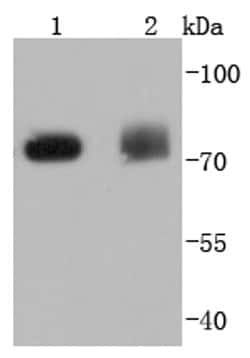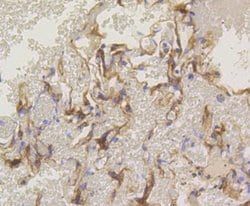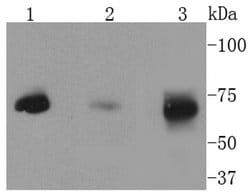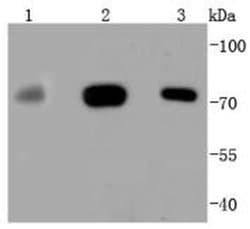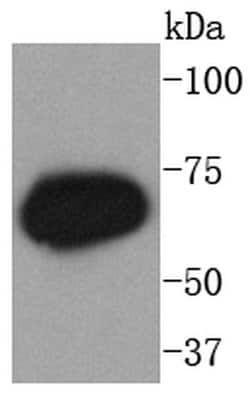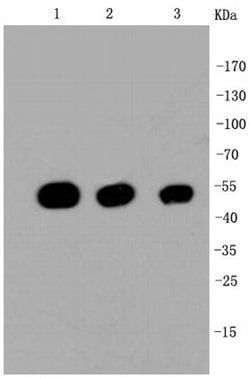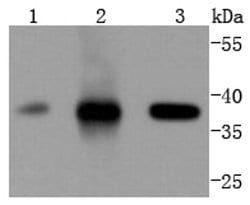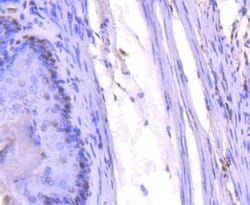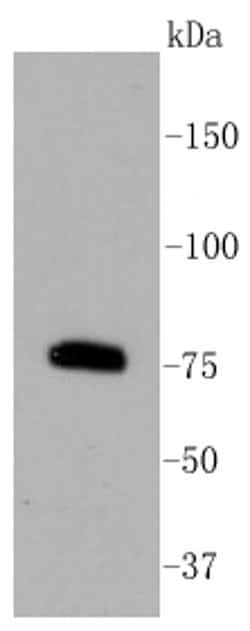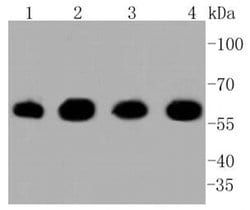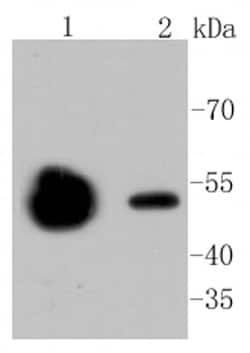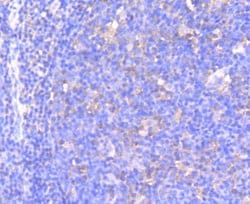PKC beta-2 Recombinant Rabbit Monoclonal Antibody (ST48-06), Invitrogen™
Manufacturer: Thermo Scientific
Select a Size
| Pack Size | SKU | Availability | Price |
|---|---|---|---|
| Each of 1 | PIMA532161-Each-of-1 | In Stock | ₹ 46,413.50 |
PIMA532161 - Each of 1
In Stock
Quantity
1
Base Price: ₹ 46,413.50
GST (18%): ₹ 8,354.43
Total Price: ₹ 54,767.93
Antigen
PKC beta-2
Classification
Monoclonal
Concentration
1 mg/mL
Formulation
TBS with 0.05% BSA, 40% Glycerol and 0.05% sodium azide, pH 7.4
Gene Accession No.
P05771, P68403, P68404
Gene Symbols
PRKCB
Immunogen
Synthetic peptide within Human PKC beta 2 aa 615-660
Quantity
100 μL
Primary or Secondary
Primary
Target Species
Human, Mouse, Rat
Product Type
Antibody
Isotype
IgG
Applications
Flow Cytometry, Immunocytochemistry, Immunohistochemistry, Western Blot, Western Blot
Clone
ST48-06
Conjugate
Unconjugated
Gene
PRKCB
Gene Alias
A130082F03Rik, PKCB, PKC-B, PKC-beta, Prkcb, PRKCB1, Prkcb2, protein kinase C beta, protein kinase C beta I, protein kinase C beta II, protein kinase C beta type, protein kinase C beta-II, protein kinase C, beta, protein kinase C, beta 1, protein kinase C, beta 1 polypeptide
Host Species
Rabbit
Purification Method
Protein A
Regulatory Status
RUO
Gene ID (Entrez)
18751, 25023, 5579
Content And Storage
Store at 4°C short term. For long term storage, store at -20°C, avoiding freeze/thaw cycles.
Form
Liquid
Description
- Recombinant rabbit monoclonal antibodies are produced using in vitro expression systems
- The expression systems are developed by cloning in the specific antibody DNA sequences from immunoreactive rabbits
- Then, individual clones are screened to select the best candidates for production
- The advantages of using recombinant rabbit monoclonal antibodies include: better specificity and sensitivity, lot-to-lot consistency, animal origin-free formulations, and broader immunoreactivity to diverse targets due to larger rabbit immune repertoire
- The PKC family of serine/threonine kinases, including PRKCB2 (PKC beta II), is activated intracellularly by signal transduction pathways
- In humans, at least 12 different PKC polypeptides have been identified
- These isoforms differ in primary structure, tissue distribution, subcellular localization, mode of action in vitro, response to extracellular signals, and substrate specificity
- PKC alpha, beta I, beta II, and gamma form the conventional family; their activities are Ca2+- and phospholipid-dependent
- Protein kinase C (PKC) can be activated by calcium and second messenger diacylglycerol
- PKC family members phosphorylate a wide variety of protein targets and are known to be involved in diverse cellular signaling pathways
- PKC family members also serve as major receptors for phorbol esters, a class of tumor promoters
- Each member of the PKC family has a specific expression profile and is believed to play a distinct role in cells
- The protein encoded by this gene is one of the PKC family members
- This protein kinase has been reported to be involved in many different cellular functions, such as B cell activation, apoptosis induction, endothelial cell proliferation, and intestinal sugar absorption
- Studies in mice also suggest that this kinase may also regulate neuronal functions and correlate fear-induced conflict behavior after stress
- Alternatively spliced transcript variants encoding distinct isoforms have been reported.
